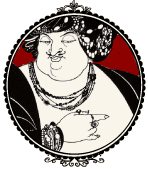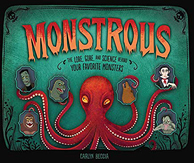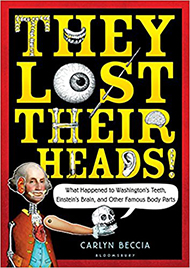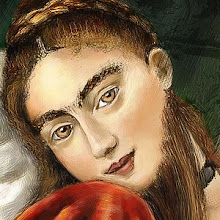 When you hear the name Lucrezia Borgia, many can’t help but think of the woman popularized in operas and fiction novels as the most infamous femme fatale in history. Rumors abound of the poisons, like La Cantarella, that Lucrezia was quick to dust upon her guest’s foods. In one colorful tale, Lucrezia had a poisoned ring with a hidden needle which she used to prick her enemies and secretly murder them.
When you hear the name Lucrezia Borgia, many can’t help but think of the woman popularized in operas and fiction novels as the most infamous femme fatale in history. Rumors abound of the poisons, like La Cantarella, that Lucrezia was quick to dust upon her guest’s foods. In one colorful tale, Lucrezia had a poisoned ring with a hidden needle which she used to prick her enemies and secretly murder them. Today, we know that the tales of poisoning are complete rubbish, but her family cannot be forgiven so easily. Born the bastard daughter of Pope Alexander VI (Rodrigo Borgia), Lucrezia was surrounded by intrigue and decadence during the height of the church’s corruption. The year she was born, 1480, marked the flowering of Renaissance art and literature, but also a time where it was commonplace for Popes to have concubines and poisoning one’s enemies was considered a gentleman’s way of removing political obstacles. Machiavelli wrote of Alexander VI that he, 'never did or thought of anything but deceiving people. ' Machiavelli was especially fond of Lucrezia's diabolical brother, Cesare Borgia who would later become his role model for political ambition along with the poster child for syphilis.
Today, we know that the tales of poisoning are complete rubbish, but her family cannot be forgiven so easily. Born the bastard daughter of Pope Alexander VI (Rodrigo Borgia), Lucrezia was surrounded by intrigue and decadence during the height of the church’s corruption. The year she was born, 1480, marked the flowering of Renaissance art and literature, but also a time where it was commonplace for Popes to have concubines and poisoning one’s enemies was considered a gentleman’s way of removing political obstacles. Machiavelli wrote of Alexander VI that he, 'never did or thought of anything but deceiving people. ' Machiavelli was especially fond of Lucrezia's diabolical brother, Cesare Borgia who would later become his role model for political ambition along with the poster child for syphilis. Even by Renaissance standards, growing up a Borgia was like living a life straight out of the Godfather. Dinner guests had a habit of winding up dead and late night antics often involved a few debauched orgies. And just like true Renaissance godfathers, they epitomized Don Vito Corlione's mantra of “keep your friends close, but your enemies closer.” At the time, Italy was broken up into a bunch of warring city states where the Pope had to form outside alliances quickly and deftly to stay in control. In the heart of these shifting alliances, Lucrezia became a valuable bargaining chip in the marital market. Unfortunately, Lucrezia’s husbands also came with expiration dates. Her family would hitch her to one man, but when the political alliance ceased to serve its purpose, they would find another match more suitable. This left Lucrezia with the helpless title of “pawn” and also made her a few enemies quick to spread rumors.
Even by Renaissance standards, growing up a Borgia was like living a life straight out of the Godfather. Dinner guests had a habit of winding up dead and late night antics often involved a few debauched orgies. And just like true Renaissance godfathers, they epitomized Don Vito Corlione's mantra of “keep your friends close, but your enemies closer.” At the time, Italy was broken up into a bunch of warring city states where the Pope had to form outside alliances quickly and deftly to stay in control. In the heart of these shifting alliances, Lucrezia became a valuable bargaining chip in the marital market. Unfortunately, Lucrezia’s husbands also came with expiration dates. Her family would hitch her to one man, but when the political alliance ceased to serve its purpose, they would find another match more suitable. This left Lucrezia with the helpless title of “pawn” and also made her a few enemies quick to spread rumors. Bachelor #1
Bachelor #1Though careful bribes, Alexander bought himself a pope’s hat in 1492 and soon began looking for a suitable match for his beloved daughter. Lucky bachelor #1 was Giovanni Sforza, a man twice Lucrezia’s age and a bit too dull to inspire much passion in his new wife. But Giovanni came with an alliance to the powerful Milanese family so Alexander threw enough ducats at him to help him forget Lucrezia's illegitimate status. A few years later, the doting father came to the conclusion that his daughter could do better and decided to divorce Lucrezia and Giovanni on the grounds that Giovanni was impotent. Although non-consummation, was commonly used to dissolve marriages, something about the title of "impotent" just rubbed Giovanni the wrong way. That’s when the mud slinging began. Right about this time, a nasty rumor began circulating that Alexander was sleeping with his daughter. No one can prove the rumor today but my guess is that being a veteran soldier, Giovanni might have been fighting his divorce with words instead of weapons.
No one could seem to come up with a solution to the mess until Giovanni’s buddy, Ludovico Sforza (il Moro) suggested that they hold a public performance where a few qualified men could judge Giovanni’s…ahh performance. We don’t know exactly what Lucrezia thought of this suggestion, but she did decide to run away to a nunnery. Eventually, Giovanni figured out that fighting the divorce was a worthless cause that would only end up with him broke or swimming with the fishes in the Tiber River. He conceded to the charge of impotence and let his next wife prove the contrary. (He went on to father a child by her).
Bachelor #2
Alexander next decided to form and alliance with Alfonso of Aragon. Although a bastard too, Alfonso came with the backing of his father, the King of Naples and the boyish good looks that made all the ladies swoon. Lucrezia did her fair share of swooning too and was soon expecting her first child with Alfonso. All would have ended happily if Alexander had not changed his mind yet again and decided that an alliance with King Louis XII of France would suit him better. He began negotiating with Louis to marry Lucrezia's brother, Cesare to a french princess—an alliance that was in direct opposition to Lucrezia’s marriage with Alfonso. At the time, Louis was attempting to gobble up Naples which made him no friend to Alfonso's Arogonese family.
In fear of his life, Alfonso headed for the hills leaving a 6 months pregnant Lucrezia behind. Lucrezia begged her father to assure Alfonso that he would not be harmed and the runaway newlywed returned to see the birth of his first son. But if Alfonso believed a promise from a Borgia, then he was a bit of a fool. One night, he was stabbed from behind on the steps of St. Peters. His half-dead body was dragged home to a distraught Lucrezia who nursed him back to health. While Alfonso was recuperating, Alexander appointed a guard to watch him, but the guard must have taken a coffee break because someone crept in and strangled Alfonso. Suspicious? Certainly. Many people assumed that Cesare ordered the killing with the blessing of Alexander. Lucrezia was so heart-broken that her father and brother had to send her away because they could not stand to hear her weeping while they were trying to whoop it up during all those lavish banquets.
 Bachelor #3
Bachelor #3Lucrezia's third marriage alliance was quite a coup considering that Alfonso d’Este, Duke of Ferrara (shown here), came with a pedigree that was well out of her league. Alfonso was the son of Ercole d’Este and had enough legitimacy to snub his blue blood nose at his new bride. At first, he was downright disgusted to marry Lucrezia and sent his spies to Rome to dig up some dirt. Unfortunately, his spies couldn't come up with much and Alfonso was forced to marry Lucrezia. Over time, Alfonso seemed to care deeply for Lucrezia despite the fact that their marriage was not exactly the paradigm of marital fidelity. He was rather fond of his prostitutes and Lucrezia had her share of dalliances while Alfonso was out cavorting with lowlifes.
 Lucrezia's affairs
Lucrezia's affairsLucrezia may have had an affair with the great poet Pietro Bembo (shown here). It is possible that Pietro’s love for Lucrezia was more of the chivalrous kind where he would never tarnish the object of his affection with base actions. It's also possible that he restrained himself because he didn't want to end up hanging from the rafters. Whether chivalry or true passion, their love letters would certainly make even the biggest cynic blush. Here is one of my favorites:
Bembo to Lucrezia:
The supreme cause which at the start did give
Things created their measure and their state
Willed me to love you and accept my fate
To manifest the faith whereby we live.
As virtues from that principle derive,
Ruler, moderator, sole joy innate
Whose face the fortunate may contemplate
Who seeling peace by grace abounding strive,
Yours is the radiance which makes me burn,
And growing with each act and gracious word
My joy in seeing you is never done.
Nor for my restlessness is there reward
Higher than yourself, wherefore I turn
To you, as heliotrope looks to the sun.
 Lucrezia was also linked with Francesco Gonzaga (shown here), husband of one of her greatest rivals, Isabella d’Este. This affair seems more plausible given his over-sexual nature, but again cannot be proven. Francesco had a fondness for young boys, horses, and prostitutes that eventually ended with him having a bad itch in his nether regions. He broke off his affair with Lucrezia when the syphilitic pustules became a turn off.
Lucrezia was also linked with Francesco Gonzaga (shown here), husband of one of her greatest rivals, Isabella d’Este. This affair seems more plausible given his over-sexual nature, but again cannot be proven. Francesco had a fondness for young boys, horses, and prostitutes that eventually ended with him having a bad itch in his nether regions. He broke off his affair with Lucrezia when the syphilitic pustules became a turn off.Lucrezia Borgia: Dumb Blond or Savvy Entrepreneur?
Because her family was so notorious for debauchery and violence (I have barely touched the surface of all the scandals), much of what we know of Lucrezia is seen only through the eyes of the men that manipulated her. But was she just an abused pawn in her family’s political gain? Recent research shows that Lucrezia had many entrepreneurial talents and amassed her wealth through many careful investments in land reclamation. Using her persuasive nature, she settled border disputes and unlike other women of her day, held the titled to her investments. Sure, she spent an inordinately long time washing her hair, but she also spoke 5 languages, was trusted to handle her father affairs while he was absent, became a great patron of the arts and supported many charities.
In 1519, Lucrezia Borgia died giving birth to her eighth child. Alfonso was so grieved that he fainted at her funeral. Lucrezia and Alfonso did come to share a mutual respect and understanding, but her greatest love may have been the family she obeyed despite her own heart.
Sources and Further Reading:
Bradford, Sarah. Lucrezia Borgia - Life, Love And Death In Renaissance Italy, New York:NY, Viking 2004
Bellonci, Maria. Lucrezia Borgia, New York:NY, Phoenix 2002.
Translated by: Shankland, Hugh. The Prettiest Love Letters in the World, Boston:MA, David R. Godine, 1987.
Diane Yvonne Ghirardo, “Lucrezia Borgia as Entrepreneur.” Renaissance Quarterly 61 (2008): 53-91.












6 comments:
Fantabulous post Carlyn! I can never get enough of that Borgia family. Thanks for this wonderful post. Too often demonized by history, Lucrezia was brilliant and definitely a survivor of her times- can we really blame her completely? Thanks!
Terrific post, Carlyn! I've always wondered whether to invite Lucrezia to my proverbial "if you could throw a dinner party for 10 people..." game. I really want to know the truth about her relationship with her father and brother. But would she divulge it? She has always fascinated me (and I'm so disappointed that the Lucrezia Borgia "poison ring" that belonged to my grandmother is based in fancy rather than fact).
P.S. On second thought, I might not survive that dinner, if I invited Lucrezia.
Wonderful post Carlyn. Lucrezia Borgia was one of the first Scandalous Women that I wrote about. They were going to make a movie about The Borgias starring Scarlett Johansen as Lucrezia and Ewan McGregor as her brother but it never came to pass. I'm hoping that if I get to do a sequel to Scandalous Women I can include Lucrezia.
Great overview however she was certainly no dumb blonde, as the tresses on display at Milan's pinacoteca Ambrosiana clearly show her to be a red head.
Thanks! I saw them when I went to Milan too and I would say they were strawberry blonde but she definitely was not a red head. It is very possible she dyed her hair too. Most highborn Renaissance women did.
Post a Comment